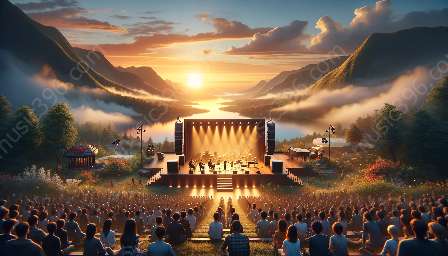In today's digital age, algorithmic music composition is transforming the landscape of music creation and distribution. This innovative approach has significant implications for copyright law and the role of digital platforms in music copyright.
Algorithmic music composition involves the use of algorithms and artificial intelligence (AI) to create original musical compositions and arrangements. This process raises intricate legal and ethical questions, especially in the context of music copyright law.
Algorithmic Music Composition and Copyright Law
As algorithmic music composition gains traction, it challenges traditional notions of authorship and intellectual property rights in music. The core issue lies in determining the rightful ownership and protection of music generated through algorithms. Unlike music created by human composers, algorithm-generated music blurs the lines between creativity and automation, posing unique challenges for copyright regulation.
Current copyright laws are based on human authorship, making it challenging to accommodate music produced by algorithms. The lack of clear attribution and authorship raises questions about the originality and ownership of algorithm-generated music. This ambiguity requires a reevaluation of copyright frameworks to accommodate technological advancements in music creation.
Role of Digital Platforms in Music Copyright
Digital platforms play a pivotal role in the dissemination and consumption of algorithmic music compositions. These platforms provide the infrastructure for distributing, licensing, and monetizing algorithm-generated music, shaping the landscape of music copyright in the digital era. As technology continues to evolve, digital platforms serve as the primary conduit for algorithmic music to reach global audiences.
However, the increasing prevalence of algorithmic music on digital platforms raises concerns about the fair compensation and recognition of creators. Copyright law must adapt to address the unique challenges posed by algorithmic music and ensure that creators are fairly compensated for their work when distributed through digital channels.
Intersecting Realms: Music Copyright Law and Algorithmic Composition
The intersection of music copyright law and algorithmic composition necessitates a comprehensive approach to address the evolving landscape of music creation and distribution. Regulatory frameworks must recognize the impact of algorithms on music composition and distribution, incorporating provisions that uphold the rights of creators while embracing technological innovation.
Efforts to reconcile algorithmic music composition with copyright law involve striking a balance between fostering innovation and safeguarding the rights of musicians, composers, and music creators. This entails redefining copyright principles to accommodate the changing dynamics of music creation, distribution, and consumption in the digital age.
Embracing Innovation and Legal Adaptation
The evolution of algorithmic music composition underscores the need for legal adaptation to encompass technological advancements while preserving the integrity of music copyright. Embracing innovation within the framework of copyright law presents an opportunity to create a more inclusive and equitable environment for creators and consumers alike.
As digital platforms continue to shape the music industry, regulatory bodies and legal experts must collaborate to establish clear guidelines that address the implications of algorithmic music composition. This collaborative approach aims to promote creativity, protect intellectual property, and ensure the equitable treatment of algorithmic music creators within the existing copyright framework.
In conclusion, algorithmic music composition has profound implications for copyright law, particularly within the context of digital platforms and the evolving landscape of music copyright. The interplay between technology, creativity, and legal frameworks necessitates a holistic evaluation of copyright regulations to accommodate the transformative impact of algorithmic music on the music industry.


